
The Philippines are challenging China before a court at the Hague claiming that China’s “nine-dash-line” is not legitimate. The nine-dash-line is a U-shaped boundary dividing Chinese and Philippine naval territory. The dispute has been marked by episodes of encroaching on the boundary by both Chinese and Philippine vessels. The Philippine foreign minister argued that China’s encroachment is driven primarily by its rapidly increasing number of vessels.
China’s claim to the territory is supported by its historical claim to the naval territory, based on discoveries by Chinese explorers around 2,000 years ago. China also quarrels with what they claim to be illegal occupation of Chinese islands by other countries. Moving forward, it will be interesting to see China’s continued relationships with its neighbors both diplomatically and economically.
Further reading: http://www.aljazeera.com/indepth/features/2014/03/philippines-sues-china-over-sea-claims-nine-dashed-line–201433055112597830.html
If any quarrels escalate, I would expect China’s opponent to back down. I can’t imagine The Philippines out muscling China over territory arguments.
Recently China has started to butt heads with its neighbors over small island claims. Fortunately, they have been peaceful, but if China continues to try and extend its boundaries, these arguments over land claims could escalate into violence. If this happens. It will be interesting to see how the rest of the world reacts if it violence erupts.
I would expect significant diplomatic and international pressure to resolve this border dispute peacefully.
A similar situation has unfolded between China and Japan over a small string of islands. Neither side has given way, as the islands were part of an agreement that was reached after the recent war between the two countries.
Just because the Chinese knew the shoals, recorded by one or another gazetteer, doesn’t mean China automatically owns the islands. Some may be valuable for fishing or fossil fuels, and with the Law of the Sea in mind they have to be consistent – if they claim one they have to claim them all. For example, while sailors knew of the Senkaku Islands, there’s no evidence anyone of any people or nation tried to make use of them before the Japanese in the 19th century, when they were used as a fishing ground and when a few families settled on them.